![[BACK BUTTON]](http://kcm.co.kr/bethany/graphics/back.jpg)
Following is information on some current key leaders in the world of Islam. More biographies will be added periodically.
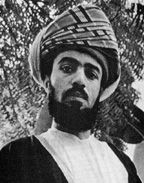 Name: Qabus bin Said bin Taimur
Name: Qabus bin Said bin TaimurQabus bin Said bin Taimur is the 14th Sultan of the Al Bu Said Dynasty of Oman. His family has ruled Oman since the 1740's.
Born November 14, 1940, Qabus led a lonely and restrictive childhood, forbidden to visit the beach, play games, or talk with his tutors about things unrelated to his studies. At the age of 16 he was sent to England to a private academy for 5 years, where he became an expert horseman and developed a taste for classical music. He graduated a private military academy in 1962 and became an officer of the British Army's Scottish Rifles, serving in Germany for a year.
In 1965, Qabus was called home and commanded by his family to memorise the Koran. He was confined for 6 years - forbidden to marry or receive guests. In 1970, he deposed his father and became Sultan.
Until 1970, Oman was considered a self-isolated Arab backwater. Most Omanis are Ibadhi Muslims - a Shi'ite group which believes in direct rule by God. Sultan Qabus began a program of modernisation and development and has brought Oman into the modern era, even though much of the country's population still continues to adhere to a semi-nomadic lifestyle.
 Name: Tahir Amad
Name: Tahir AmadBorn in East Punjab to a farmer with 13 sons and 9 daughters and several wives, Tahir Ahmad is the leader of one of the Islamic world's fastest growing sects. Membership is now estimated at about 10 million, with approximately half in Pakistan.
Ahmad studied at the University of the Punjab before going on to London's School of Oriental & African Studies. He fled Pakistan in the 1980's because of persecution there: the Ahmadis were declared non-Muslims in 1974 and restrictions were increased in the 80's. The Ahmadis teach that their founder was the Madhi (the Islamic "Messiah") as well as a reincarnation of both Christ and Krishna. The Ahmadis have missionaries throughout Africa and Asia and are making perhaps 100,000 converts a year.
Ahmad now lives with his wife and 3 daughters in Wimbledon, London.
 Name: Abdurrahman Wahid
Name: Abdurrahman WahidAbdurrahman Wahid is one of Indonesia's most influential figures. His Council of Islamic Scholars (Nahdlatul Ulama) has an estimated 20 - 40 million members. He has been an active social campaigner.
Wahid formally withdrew from politics in 1984, but caused frequent controversy in Islamic circles.
Recently Wahid set up a discussion group to examine democratic reforms. The government of Indonesia has tolerated the group in part because of Wahid's stature and public reputation. He has worked well with minorities in Indonesia, including Christians.
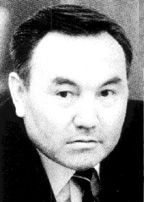 Name: Nursultan Nazarbayev
Name: Nursultan NazarbayevNursultan Nazarbayev is president of a political unit which has become the world's tenth largest nation and one of the world's newest nuclear power nations.
Nazarbayev was born to a poor agricultural family and remembers collectivisation with bitterness. He became first a steel worker and then the manager of a steel mill, before he became a Communist Party member in 1962. He resigned his membership after the coup attempt against Gorbachev.
Nazarbayev was first suggested for the office of President of Soviet Republic of Kazakhstan in 1986, but was blocked by Gorbachev. He was given the presidency in 1989.
Nazarbayev has gained stature as an international diplomat, has travelled widely and is reportedly a good parliamentarian. He faces several challenges: The environment has been devastated by nuclear tests and agricultural chemicals. The country is about 50% Muslim and it is uncertain whether it will align itself with the Muslim world.
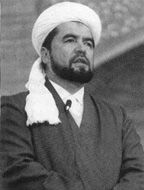 Name: Mohamed Sadiq Yusef
Name: Mohamed Sadiq YusefMohamed Sadiq Mohamed Yusuf is the son of an Uzbek farmer. He is fluent in Arabic. In March of 1989, at the Fourth Congress of the Muslims of Central Asia and Kazakhstan, he was elected to the office of Grand Mufti of Central Asia - which gave him administrative authority over the Government run Spiritual Directorate of Tashkent, a place on the USSR's Supreme Soviet, a seat in the Uzbek Parliament, and oversight of all Soviet Muslims in religious matters.
Within a week of taking office, the new Grand Mufti commented on the need to bring Salman Rushdie before an impartial but Islamic court. Before his first month was over, he told the Soviet press of the "desperate need" for more mosques, Korans and Muslim clergy. In March of 1990, work was begun on an Uzbek translation of the Koran. In May of 1990, the Grand Mufti's Tashkent Spiritual Directorate began publishing Ray of Islam - the nation's first Islamic newspaper. The Grand Mufti has been called the key to the Islamic Resurgence in Central Asia - the only religious leader known throughout the region.
But things have hot been always easy for the Mohamed Sadiq. Uzbekistan's President once called him as a threat to the region's stability. At least twice since he took office, attempts have been made to remove him.
 Name: Saddam Hussein
Name: Saddam HusseinBorn in 1937 to a poor family, Saddam Hussein grew up without a father - and the uncle who looked after him was imprisoned by British when Saddam still was young, leaving him bitter.
Saddam entered politics as a young man and took part in a 1956 coup attempt. In 1959 he was picked by the Baath Socialist Party to assassinate the ruler at that time. The attempt failed and Saddam was wounded. He escaped to Syria and became a hero to the Baath Party in Iraq.
Since taking power in 1979, Saddam has developed a personality cult matched by very few modern rulers. His picture is everywhere, the penalty for speaking ill of him is death. His concern for security sometimes borders on paranoia. He has also developed a reputation of being ruthless which has included the execution of rivals who were once close friends. The average 20 hangings a month in Iraq has won him the title "Butcher of Baghdad".
Hussein has been the source of a great deal of destabilisation in the Middle East. Threats against Israeli security, nuclear ambitions, chemical attacks on Kurdish civilians, the war with Iran and the annexation of Kuwait are just a few examples.
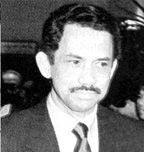 Name: Muda Hassanal Bolkiah Mu'izzadin Waddaulah
Name: Muda Hassanal Bolkiah Mu'izzadin WaddaulahSultan Sir Muda Hassanal Bolkiah Mu'izzadin Waddaulah is the 29th Sultan of Brunei. THe first Sultan was crowned in the early 1500's by the Sultan of Johor. TOday the Sultan is the world's wealthiest person, estimated to be worth $25 billion. At age 47, he cultivates the image of being generous, benign, approachable; but Brunei has been under emergency rule since a 1969 coup attempt and the Sultan remains an absolute ruler.
With some 280,000 residents, Brunei has the world's highest per capita income. Education and health care are free. All government workers get free trips to Mecca. However, citizenship is reserved for Malays and the 40% of the population which is Chinese or Iban/Dayak sometimes feel mistreated.
The Sultan recently spent over $100 million on a 15 day celebration of his 25th anniversryu on the throne. He made a million dollar gift to Bosnia as part of the celebration.
The Sultan is also famous for his 200 Argentine polo ponies which live in air conditioned stalls. Brunei is closed to expatriate missionaries.
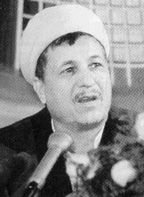 Name: Ali Akbar Hashemi Rafsanjani
Name: Ali Akbar Hashemi RafsanjaniA long-time disciple of Ayatollah Ruhollah Khomeini and founding member of the Islamic Revolutionary Party, Rafsanjani has risen to be the head of Iran's government.
Born in 1934, he began religious training in his early teens. He went to Qum to study under Khomeini in the 1950s. When Khomeini was exiled from Iran in the 1960s, Rafsanjani became his chief organiser and fund raiser in Iran. Rafsanjani was jailed for 3 years in the 1970s.
Rafsanjani was badly wounded in a 1979 assassination attempt. He has survived several such attempts. He was elected to parliament in 1980 and became it's speaker. Later he was made commander-in-chief of the Iranian military. He has at times encouraged terrorism, and at times condemned it.
Rafsanjani is considered to be the most pragmatic of Iran's major religious leaders. In 1989 he became president after the power of that office was greatly increased.
At that time he also became an ayatollah, which gave him the power to interpret Islamic law.
 Name: Suharto
Name: SuhartoAfter graduating from High School, Suharto joined the Dutch colonial army, and later (after the Japanese conquest of 1942), joined the defense corps. When Indonesia became independent in 1950, Suharto held the rank of Lieutenant colonel.
During the 1960's Suharto led the army in putting down an alleged communist cooup in 1965, as well as directing several purges against communists and leftists in public life.
Suharto took control of the Indonesian Government on March 1966, and was elected President in 1968 by the Consultative Congress.
![[BACK BUTTON]](http://kcm.co.kr/bethany/graphics/back.jpg)